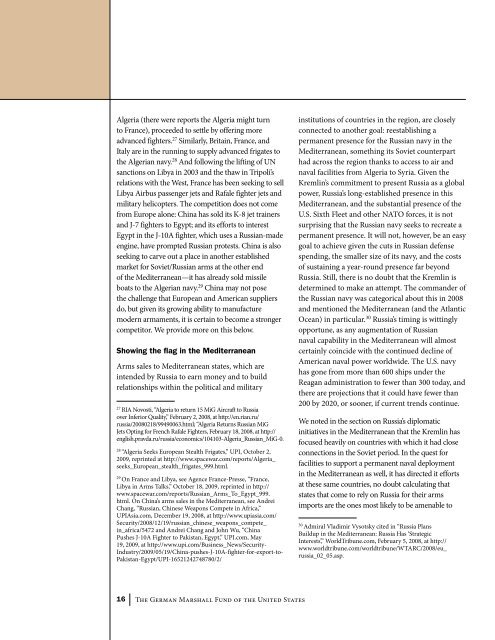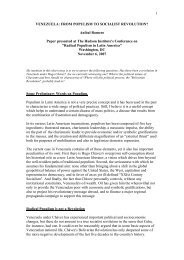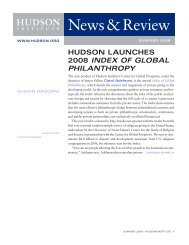NEW PLAYERS IN THE MEDITERRANEAN - German Marshall ...
NEW PLAYERS IN THE MEDITERRANEAN - German Marshall ...
NEW PLAYERS IN THE MEDITERRANEAN - German Marshall ...
You also want an ePaper? Increase the reach of your titles
YUMPU automatically turns print PDFs into web optimized ePapers that Google loves.
Algeria (there were reports the Algeria might turn<br />
to France), proceeded to settle by offering more<br />
advanced fighters. 27 Similarly, Britain, France, and<br />
Italy are in the running to supply advanced frigates to<br />
the Algerian navy. 28 And following the lifting of UN<br />
sanctions on Libya in 2003 and the thaw in Tripoli’s<br />
relations with the West, France has been seeking to sell<br />
Libya Airbus passenger jets and Rafale fighter jets and<br />
military helicopters. The competition does not come<br />
from Europe alone: China has sold its K-8 jet trainers<br />
and J-7 fighters to Egypt; and its efforts to interest<br />
Egypt in the J-10A fighter, which uses a Russian-made<br />
engine, have prompted Russian protests. China is also<br />
seeking to carve out a place in another established<br />
market for Soviet/Russian arms at the other end<br />
of the Mediterranean—it has already sold missile<br />
boats to the Algerian navy. 29 China may not pose<br />
the challenge that European and American suppliers<br />
do, but given its growing ability to manufacture<br />
modern armaments, it is certain to become a stronger<br />
competitor. We provide more on this below.<br />
Showing the flag in the Mediterranean<br />
Arms sales to Mediterranean states, which are<br />
intended by Russia to earn money and to build<br />
relationships within the political and military<br />
27<br />
RIA Novosti, “Algeria to return 15 MiG Aircraft to Russia<br />
over Inferior Quality,” February 2, 2008, at http://en.rian.ru/<br />
russia/20080218/99490063.html; “Algeria Returns Russian MiG<br />
Jets Opting for French Rafale Fighters, February 18, 2008, at http://<br />
english.pravda.ru/russia/economics/104103-Algeria_Russian_MiG-0.<br />
28<br />
“Algeria Seeks European Stealth Frigates,” UPI, October 2,<br />
2009, reprinted at http://www.spacewar.com/reports/Algeria_<br />
seeks_European_stealth_frigates_999.html.<br />
29<br />
On France and Libya, see Agence France-Presse, “France,<br />
Libya in Arms Talks,” October 18, 2009, reprinted in http://<br />
www.spacewar.com/reports/Russian_Arms_To_Egypt_999.<br />
html. On China’s arms sales in the Mediterranean, see Andrei<br />
Chang, “Russian, Chinese Weapons Compete in Africa,”<br />
UPIAsia.com, December 19, 2008, at http://www.upiasia.com/<br />
Security/2008/12/19/russian_chinese_weapons_compete_<br />
in_africa/5472 and Andrei Chang and John Wu, “China<br />
Pushes J-10A Fighter to Pakistan, Egypt,” UPI.com, May<br />
19, 2009, at http://www.upi.com/Business_News/Security-<br />
Industry/2009/05/19/China-pushes-J-10A-fighter-for-export-to-<br />
Pakistan-Egypt/UPI-16521242748780/2/<br />
institutions of countries in the region, are closely<br />
connected to another goal: reestablishing a<br />
permanent presence for the Russian navy in the<br />
Mediterranean, something its Soviet counterpart<br />
had across the region thanks to access to air and<br />
naval facilities from Algeria to Syria. Given the<br />
Kremlin’s commitment to present Russia as a global<br />
power, Russia’s long-established presence in this<br />
Mediterranean, and the substantial presence of the<br />
U.S. Sixth Fleet and other NATO forces, it is not<br />
surprising that the Russian navy seeks to recreate a<br />
permanent presence. It will not, however, be an easy<br />
goal to achieve given the cuts in Russian defense<br />
spending, the smaller size of its navy, and the costs<br />
of sustaining a year-round presence far beyond<br />
Russia. Still, there is no doubt that the Kremlin is<br />
determined to make an attempt. The commander of<br />
the Russian navy was categorical about this in 2008<br />
and mentioned the Mediterranean (and the Atlantic<br />
Ocean) in particular. 30 Russia’s timing is wittingly<br />
opportune, as any augmentation of Russian<br />
naval capability in the Mediterranean will almost<br />
certainly coincide with the continued decline of<br />
American naval power worldwide. The U.S. navy<br />
has gone from more than 600 ships under the<br />
Reagan administration to fewer than 300 today, and<br />
there are projections that it could have fewer than<br />
200 by 2020, or sooner, if current trends continue.<br />
We noted in the section on Russia’s diplomatic<br />
initiatives in the Mediterranean that the Kremlin has<br />
focused heavily on countries with which it had close<br />
connections in the Soviet period. In the quest for<br />
facilities to support a permanent naval deployment<br />
in the Mediterranean as well, it has directed it efforts<br />
at these same countries, no doubt calculating that<br />
states that come to rely on Russia for their arms<br />
imports are the ones most likely to be amenable to<br />
30<br />
Admiral Vladimir Vysotsky cited in “Russia Plans<br />
Buildup in the Mediterranean: Russia Has ‘Strategic<br />
Interests’,” WorldTribune.com, February 5, 2008, at http://<br />
www.worldtribune.com/worldtribune/WTARC/2008/eu_<br />
russia_02_05.asp.<br />
16<br />
The <strong>German</strong> <strong>Marshall</strong> Fund of the United States
















